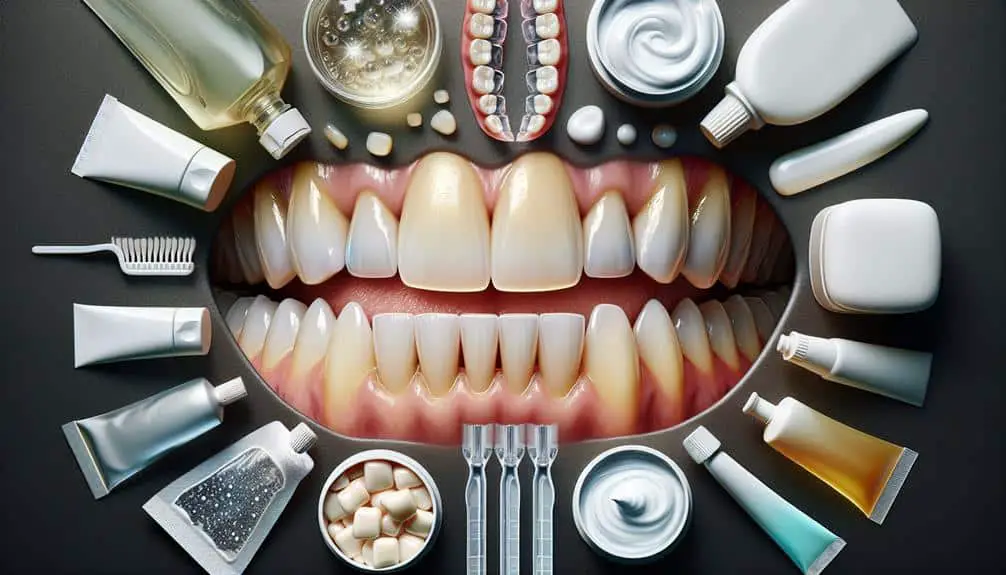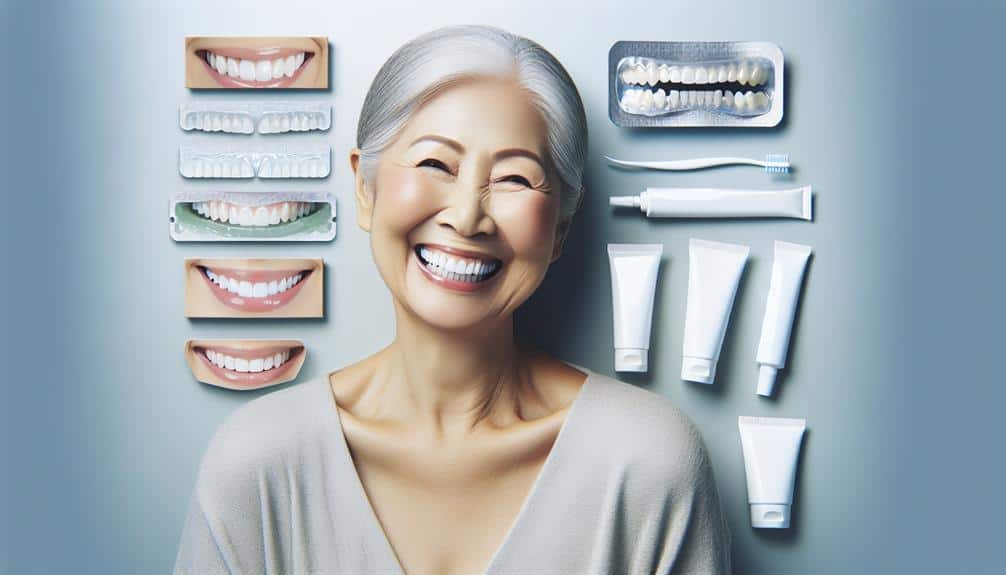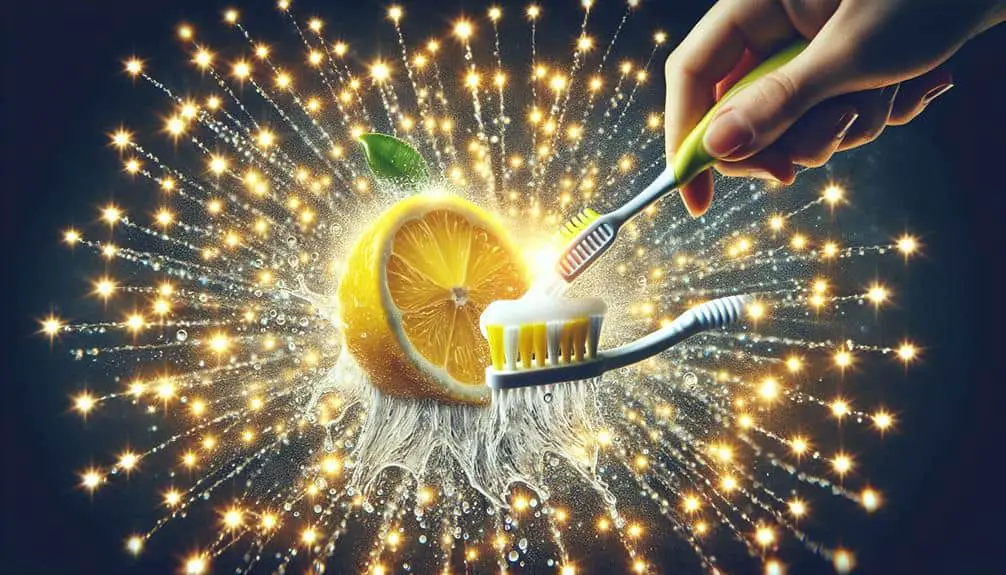For aging teeth, consider professional whitening treatments offered by reputable dentists, which use effective bleaching agents such as hydrogen peroxide personalized to your needs. At-home whitening kits with ADA-approved brands like whitening trays and strips are convenient options. Natural remedies like herbal remedies and dietary changes can help, while whitening toothpaste and mouthwash with fluoride and whitening agents maintain brightness. Adopting lifestyle changes like a balanced diet and hydration can also contribute to whiter teeth. Exploring these solutions can assist you in achieving the radiant smile you desire.
Key Points
- Professional whitening treatments with bleaching agents offer effective results.
- At-home whitening kits with ADA-approved brands provide convenient maintenance.
- Natural remedies like herbal treatments and oil pulling can help whiten teeth.
- Whitening toothpaste and mouthwash containing whitening agents are beneficial.
- Lifestyle changes such as a balanced diet and hydration support whiter teeth.
Professional Whitening Treatments
When considering professional whitening treatments for aging teeth, consulting with a reputable dentist is essential to guarantee safe and effective results. Dental procedures in cosmetic dentistry offer various options to address tooth discoloration associated with aging. Professional whitening treatments conducted in a dental office typically involve the application of bleaching agents like hydrogen peroxide or carbamide peroxide. These agents penetrate the tooth enamel to break down stains effectively.
Your dentist will begin by examining your teeth to determine the cause of discoloration and the most suitable whitening approach. Professional whitening treatments are tailored to individual needs, ensuring a personalized and targeted solution. During the procedure, your dentist will protect your gums and soft tissues before applying the whitening agent to your teeth. The process may involve the use of a special light or laser to activate the bleaching agent, enhancing its efficacy.
At-Home Whitening Kits
To continue enhancing the whiteness of your aging teeth, exploring the efficacy of At-Home Whitening Kits provides a convenient option for maintaining your smile's brightness outside the dental office.
DIY whitening trays and whitening strips are popular choices in these kits. DIY whitening trays are custom-fit trays that you fill with a whitening gel and wear for a specified period. These trays guarantee the gel stays in place, maximizing its effectiveness.
On the other hand, whitening strips are thin, flexible plastic strips coated with a whitening gel. You apply these strips directly to your teeth, allowing the gel to work on whitening them. Both options are convenient and can be effective if used consistently.
When choosing an at-home whitening kit, look for reputable brands with ADA approval to ensure safety and quality. Remember to follow the instructions carefully to achieve the best results without causing damage to your teeth.
Natural Whitening Remedies
For a natural approach to whitening your teeth, consider incorporating certain home remedies into your oral care routine. Here are three evidence-based natural whitening remedies that you can try:
- Dietary Changes: Consuming crunchy fruits and vegetables like apples, carrots, and celery can help naturally scrub away surface stains on your teeth. Additionally, incorporating foods rich in vitamin C, such as oranges and strawberries, can help prevent discoloration by strengthening gums and teeth.
- Herbal Remedies: Certain herbs like sage, basil, and thyme possess natural whitening properties. You can create a homemade mouthwash by steeping these herbs in hot water, allowing the solution to cool, and then swishing it around in your mouth.
- Oil Pulling: This ancient practice involves swishing a tablespoon of coconut oil or sesame oil in your mouth for about 15-20 minutes. Oil pulling can help remove bacteria, plaque, and stains from your teeth, promoting a brighter smile over time.
Whitening Toothpaste and Mouthwash
Contemplate incorporating whitening toothpaste and mouthwash into your oral care routine for a convenient way to enhance the brightness of your smile. Whitening toothpaste often contains abrasives or enzymes that work to remove surface stains on your teeth, resulting in a brighter appearance over time. Look for toothpaste with fluoride, which not only strengthens enamel but also helps prevent tooth decay. Fluoride treatments at the dentist can also aid in keeping your teeth healthy and white.
When it comes to mouthwash, opt for whitening formulas that can help reduce stains and freshen your breath. Some mouthwashes contain hydrogen peroxide, which is known for its whitening properties. However, be cautious with charcoal toothpaste as its abrasive nature can potentially harm your enamel over time if not used correctly. Always follow the instructions provided on the product for safe usage.
Lifestyle Changes for Whiter Teeth
Implementing healthy habits like maintaining a balanced diet and reducing consumption of staining beverages can contribute to the natural whiteness of your teeth. Making simple lifestyle changes can help prevent further discoloration and promote a brighter smile.
Consider the following tips:
- Diet Modifications: Incorporate more crunchy fruits and vegetables like apples, carrots, and celery into your meals. These foods can help naturally scrub away surface stains on your teeth.
- Oral Hygiene Habits: Brush your teeth at least twice a day with a whitening toothpaste containing fluoride. Additionally, consider using a straw when consuming dark-colored beverages like coffee, tea, or red wine to minimize their contact with your teeth.
- Hydration: Drink plenty of water throughout the day to rinse away food particles and reduce the buildup of plaque that can lead to stains. Staying hydrated also helps maintain saliva production, which aids in keeping your mouth clean and healthy.
Frequently Asked Questions
Are There Any Specific Foods or Drinks That Should Be Avoided to Prevent Further Staining of Aging Teeth?
To prevent further staining of aging teeth, avoid foods and drinks that are known to cause discoloration, such as coffee, tea, red wine, and dark berries. These dietary restrictions can help maintain a brighter smile.
How Long Do the Results of Professional Whitening Treatments Typically Last for Aging Teeth?
To maintain results from professional whitening, consider a diligent maintenance routine. Professional treatments often last longer than at-home solutions, but may cost more. Long-term effectiveness depends on care. Consistent upkeep is key for lasting brightness.
Are There Any Potential Risks or Side Effects Associated With Using At-Home Whitening Kits on Aging Teeth?
When utilizing at-home whitening kits on aging teeth, you should be cautious about potential risks. Enamel erosion and sensitive gums can occur, resulting in tooth sensitivity and gum irritation. It is important to follow instructions carefully and consult a dentist if concerns arise.
Can Natural Whitening Remedies, Such as Baking Soda or Activated Charcoal, Be Harmful to Aging Teeth in the Long Run?
Considering natural whitening remedies like baking soda or activated charcoal may seem harmless, but in the long run, they can contribute to enamel erosion and sensitivity concerns. It is crucial to ponder the potential long-term effects of these DIY remedies.
Are There Any Specific Ingredients in Whitening Toothpaste and Mouthwash That Should Be Avoided for Aging Teeth With Sensitivity Issues?
When evaluating whitening products for aging teeth with sensitivity concerns, it's essential to prioritize ingredient safety over just whitening effectiveness. Avoid harsh chemicals like peroxide and opt for gentler options like fluoride or potassium nitrate for better oral health.



